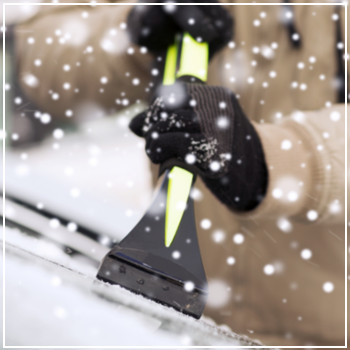 Driving in snow and ice is risky enough, but leaving your car sitting idle all winter isn't great either. Extreme cold can wreak havoc on your vehicle, causing parts to break and fluids to thicken, putting extra stress on the system and potentially harming your car. Here's what you need to know to keep your ride in top shape.
Driving in snow and ice is risky enough, but leaving your car sitting idle all winter isn't great either. Extreme cold can wreak havoc on your vehicle, causing parts to break and fluids to thicken, putting extra stress on the system and potentially harming your car. Here's what you need to know to keep your ride in top shape.
Tires
When the temperature dips below 44°F, the rubber in your all-season tires begins to stiffen up. This loss of flexibility means your tires won’t grip the road as well, especially in snowy or icy conditions. Additionally, lower temperatures affect tire pressure—dropping by about one PSI for every 10°F decrease. If you don’t monitor your tire pressure regularly, it could drop significantly, leading to uneven tread wear, potential blowouts, or even loss of control on slick roads.
Fluids
In cold weather, your car's fluids like motor oil, transmission fluid, and antifreeze become thicker and less mobile. When this happens, the engine struggles to circulate these fluids efficiently, so it’s wise to let your car idle for 10 to 15 minutes before heading out to help thin out the oils. Skipping this step might damage internal seals or components, which could result in costly repairs down the line.
At the beginning of the season, always check your fluid levels. If they're low, top them off; if they appear cloudy or dirty, consider replacing them. It might also be beneficial to switch to a lighter oil grade or install an engine block heater or battery blanket for easier starts. Pay close attention to your coolant—it needs to remain free-flowing to prevent freezing and potential engine damage. Avoid using water or water-based solutions as coolant during winter months. Instead, opt for pure antifreeze for better protection.
Engine
Many drivers prefer to jumpstart their cars to warm up the interior quickly, but turning on the heater immediately can consume valuable energy needed to start the engine. Allow the engine to run for about 20 minutes before using the heater to ensure optimal performance without draining resources unnecessarily.
Windshields and Wipers
Windshields are particularly susceptible to cold temperatures. Contrary to popular belief, pouring hot water on the windshield is a bad idea because it could shatter the glass permanently. Similarly, cranking up the defroster on high can stress the windshield. If you're reluctant to use an ice scraper, consider using an alcohol-based solution to melt ice safely. On frigid nights, your windshield wipers can also suffer. Freezing temperatures may cause the rubber blades to stick to the glass, risking damage to the windshield. Always angle the wipers away from the glass or detach them entirely before starting the car in case of sudden icy conditions.
Battery
Cold weather significantly reduces a car battery's voltage, making it harder to start your vehicle. Batteries perform best between 30 and 90°F, and older ones (three years or more) may struggle in subfreezing temperatures. Before winter sets in, have your battery tested. If it's losing its charge or its capacity has diminished, replace it promptly. Store your car in a garage or a climate-controlled area whenever possible to shield it—and its battery—from extreme temperature fluctuations.
Leaks
Thicker fluids caused by cold weather can damage seals, leading to leaks. However, another issue to watch out for is condensation. Moisture tends to gather on metal and plastic parts, especially when your car moves between warm and cool environments. This moisture can freeze, forming ice within your power steering, brake, and transmission systems. Since ice blocks fluid pathways, it’s crucial to flush old fluids at the start of the season to eliminate any trapped moisture.
Corrosion
Rust is another winter hazard. Road salt and other debris can corrode metal parts, causing unsightly damage and compromising the integrity of critical components like the undercarriage, wheel wells, and brakes. Rust weakens the structure of your car and reduces overall performance. To combat this, rustproof your vehicle early in the season and make it a habit to wash away salt and debris, focusing particularly on the undercarriage throughout the winter.
No matter whether you need your fluids refreshed, a new battery installed, or rustproofing services, DaSilva’s Auto Body can help prepare your car for the winter ahead. Contact our Naugatuck location today to learn more or schedule an appointment.
Mtb Bicycle Inner Tube,Mountain Bike Tube,Bicycle Folding Fat Tyres Bicyces,Air Inner Tyres
HEBEI HONGYANG TIRE CO.,LTD , https://www.hongyangtyre.com
